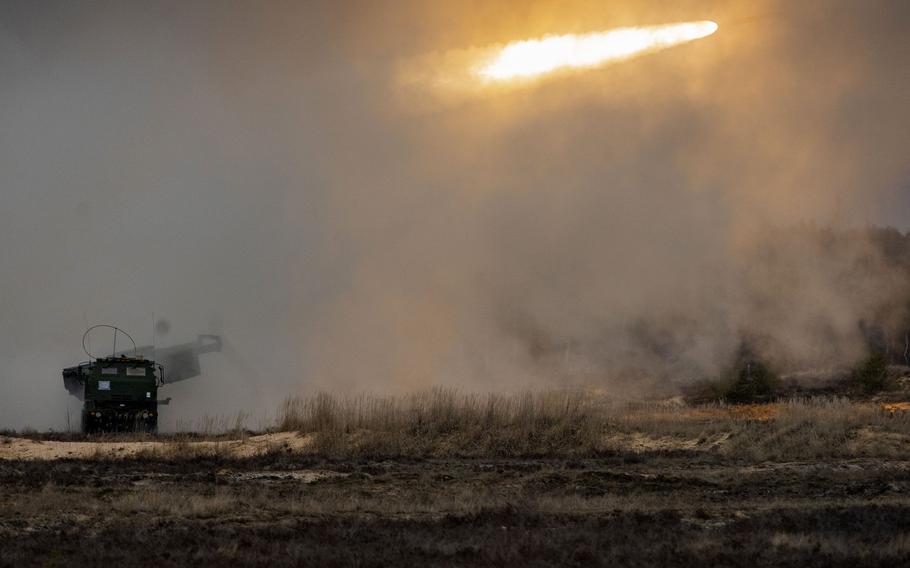
U.S. Marines with the 14th Marine Regiment, 4th Marine Division, launch rockets from a High Mobility Artillery Rocket System during live-fire training at Adazi Training Area, Latvia, March 7, 2019. A defense bill passed by lawmakers wants the Pentagon to examine how to better reinforce the Baltics with more air defenses, troop rotations and other measures aimed at countering Russia. (Andy Martinez/U.S. Marine Corps)
STUTTGART, Germany — A defense bill passed by U.S. lawmakers calls on the Pentagon to take steps to counter Russia in the Baltic region, including by potentially reinforcing air defenses and stepping up troop rotations.
The Baltic Reassurance Act is part of the National Defense Authorization Act, which was passed by House lawmakers last week.
The initiative, which still needs Senate backing, calls for the Defense Department to assess the need for more cyber, intelligence and surveillance capabilities, weapons depots and troop deployments in the Baltic region, where the U.S. military and Western security analysts have warned that NATO allies may be outgunned by Russia.
Opportunities to transfer and sell military gear to the Baltic states also should be considered, the bill says.
The Baltic region has long been an area of concern for the U.S. military in Europe. In 2016, NATO sent multinational battlegroups to Estonia, Latvia and Lithuania — all of which were annexed by the Soviet Union from the end of World War II until 1991 – and northern Poland to boost security amid a military build-up in Kaliningrad, a Russian exclave sandwiched between Poland and Lithuania.
Estonia, Latvia and Lithuania depend on NATO’s Baltic Air Policing mission to safeguard their skies. Russian military aircraft regularly encroach into Estonian air space and these violations have increased since 2014, when Russia annexed Ukraine’s Crimean Peninsula.
Parts of the Baltic region, such as the Suwalki Gap corridor that runs along the Polish and Lithuanian borders, are also vulnerable to Russian aggression, analysts and military officials have warned.
“If Russian forces ever established control over the Suwalki region or even threatened the free movement of NATO personnel and equipment through it, they would effectively cut the Baltic States off from the rest of the Alliance,” retired U.S. Army Lt. Gen. Ben Hodges warned in a 2018 report for the Washington-based Center for European Policy Analysis.
It is uncertain how the House version of the NDAA will fare in the Senate, given the partisan divide over the defense budget in the two houses and the fact that the Republican-controlled Senate passed its own NDAA last month. But the Baltic Reassurance Act provision was based on a bill authored by Texas Republican Rep. Michael Conway, suggesting bipartisan interest in doing more in the region.
The House version of the NDAA calls on the Pentagon to consider “the feasibility of providing additional air and missile defense systems in the Baltic region.”
The three former Soviet republics joined NATO in 2004. Poland joined in 1999.
It also calls for the U.S. military to analyze what the Baltic states need to “deter and resist aggression by Russia,” and to study how to “enhance the posture and response readiness” of U.S. and allied forces in the region, potentially by increasing troop rotations and numbers of forward-based troops.
The U.S. “should lead a multilateral effort to develop a strategy to deepen joint capabilities with Lithuania, Latvia, Estonia, NATO allies, and other regional partners, to deter against aggression from Russia in the Baltic region,” says the House NDAA, which was drafted as the Pentagon deepens ties with Estonia, Latvia and Lithuania.
Lithuania and the U.S. signed a defense agreement in April, under which the U.S. pledged to help the Baltic state to develop anti-tank and missile systems, and said it would continue to send forces “to strengthen deterrence and to catalyze the efforts of Estonia, Latvia and Lithuania to develop their national defense further.”
A similar agreement was struck last year with Poland, where the U.S. plans to increase the number of American troops.
vandiver.john@stripes.com Twitter: @john_vandiver